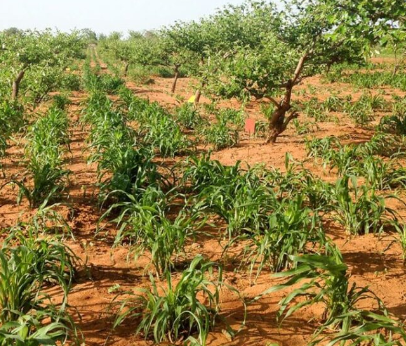In the Xiengkhouang Province, maize is the main cash crop in three of the seven districts, due to high demand for maize from animal feed producers in and outside of Laos. However, maize farming can be expensive and requires upfront investment in land preparation, hybrid seeds, fertilizer, herbicide, and more. To encourage farmers to plant maize, value chain actors — from traders and loan officers to input suppliers — are evolving new mechanisms to support farmers. USAID Laos Microenterprise, a five-year program funded by USAID and led by ACDI/VOCA, is partnering with them to help farmers strengthen their microenterprises.
In these Xiengkhouang districts, the problem facing most farmers is a lack of funds to improve their farming, coupled with the rising costs of seeds, ploughing, weeding, fertilizers, and other farming inputs. Owing to their limited income and cash flow, these farmers are unable to produce crops as efficiently or competitively. Accessing loans to help them get ahead is also a challenge.
Banks and other financial institutions offering loans are based miles away in towns and cities. Most farmers in the area are reluctant to make the arduous trip to the city to apply for and collect the loan, and then make payments to the relevant suppliers; they often also do not understand the basics of the loan application process. As a result, the loans have largely remained inaccessible to rural farmers.
Since its launch in Xiengkhouang Province, USAID Laos Microenterprise has increased the capacity of financial system actors and input suppliers to serve the agricultural sector. Firstly, the project built the capacity of savings and credit unions (SCUs) by training a local SCU in the Phoukoud District in agricultural lending. The SCU learned about risk management, loan assessment, monitoring, and how to diversify and improve their loan products. Then, in early 2022, USAID Laos Microenterprise showed the SCU how to bring financial services closer to farmers through traders, referred to as “Phou-Pa-Kop-Kan.”
The Phou-Pa-Kop-Kan, who also received support from USAID Laos Microenterprise, provided more than 500 maize farmers with seeds, fertilizers, ploughing services, and farm credits for other expenditures that season. During harvesting, the Phou-Pa-Kop-Kan came to villages with their shellers, shelled the wet cobs, and loaded them into trucks for delivery to the dryers. The farmers received payment for their crops as the maize was shelled or, in some instances, just a few days after traders delivered the maize to buyers.
“In collaboration with USAID Laos Microenterprise, we have raised up our capacity and improved our lending and monitoring of loans. Beside this, we have increased our rate of issuing loans after the idea of providing the loans through traders.” — Ms. Pheng Sikhamxay, Chief of Phoukoud Scu
The success of bringing together SCUs and traders resulted in USAID Laos Microenterprise piloting a new model in the 2022 planting season. That model involves SCUs providing loans to traders, who then source farming inputs and services and deliver them to the farmers. The traders pay back the SCUs after they sell the farmers’ harvested maize to buyers. As a result, farmers access better inputs, improve their crops, and boost their yields to earn more income in a timely manner.
“It is great now that I can support local farmers with inputs. In the past, some farmers could not afford seeds and ploughing services and even went without planting due to limited funds as they could not access lending services.” — Mr. Wat Seovongthong, Local trader
Four traders — Mr. Wat Seovongthong, Mr. Koutsy Meelavong, Mr. Xiengbouda Boudavong, and Mr. Bounkham Seovongthong — secured loans from the SCU worth 580 million LAK (about 38,000 USD). As traders, they then brought more inputs to the villages, and 25 farming families benefited from gaining access to inputs worth about 20 million LAK (1,330 USD), respectively, at 2 percent monthly interest.
“With enough funds, farmers can produce enough to meet the market demand, and, with the increased volume, farmers get to increase their income and I as a trader also increased my revenue.” — Mr. Koutsy Meelavong, Local trader
USAID Laos Microenterprise also invested 280,000 USD to help six maize traders in the Phoukoud District procure new equipment. With this support, traders have shelled 18,200 metric tons of maize, ploughed 260 hectares of land, provided 22,000 kilograms of seeds to farmers, and set up 10 demonstration plots to give farmers a vivid illustration of how to make the most of their land: increasing yields while reducing costs.
This article was originally published by ACDI/VOCA.

